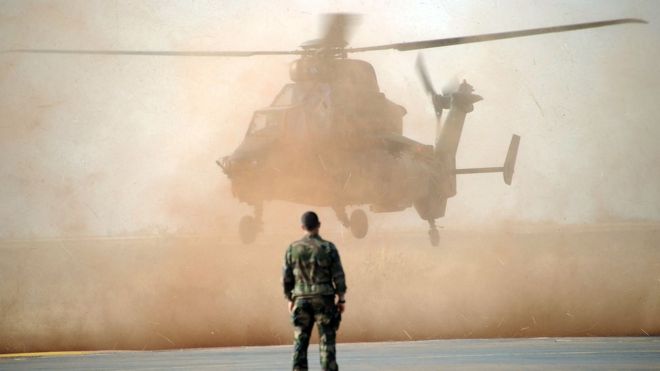A deadly mid-air collision between two French military helicopters has turned into the worst loss of life for the French military in nearly four decades, since the death of 58 French paratroopers in an attack in Beirut, Lebanon in 1983.
French President Emmanuel Macron on Tuesday expressed “deep sadness” at the news of Monday’s evening crash, which took place during a combat operation against jihadist fighters in Mali.
Macron, in a written statement, reiterated his support for the French military and saluted the “courage of the French soldiers” fighting the Islamic threat in the Sahel region. “These 13 heroes had just one goal: To protect us. I bow my head in front of the pain of their families and comrades,” Macron posted on Twitter.
The French Armed Forces Ministry released a statement saying that the accident occurred late Monday during a counter-terror operation. The choppers were providing transport and close air support for their ground troops battling Islamic insurgents in the Liptako region, near the borders of Burkina Faso and Niger. It is believed that the insurgents targeted in this operation were affiliated with ISIS.
Both the Islamic State (ISIS) and an offshoot of al-Qaeda called Jamaat Nusrat al-Islam wal-Muslimin (JNIM) are active in the Sahel.
Called the West Africa Province, by ISIS, the terror group operates in Mali, Nigeria, Niger, as well as Burkina Faso.
“The loss is heavy but the peoples of the Sahel share your bereavement,” Mali’s president, Ibrahim Boubacar Keita, said.
A Tiger attack helicopter collided with a Cougar military transport helicopter and both aircraft crashed killing nearly all personnel on board. It is unclear whether the collision was caused by hostile fire, pilot error, or a mechanical malfunction. The troops were engaging the insurgents, who were fleeing on motorbikes and in pick-up trucks, when the helicopters collided.
The dead French troops included six officers, a Master Corporal and –as confirmed by his family — the son of French Senator Jean-Marie Bockel, a centrist and former government minister who sits on the senate’s armed forces committee.
The Sahel region is a semi-arid strip below the Sahara desert. It has been struggling with rapid population growth, extreme climate shifts, as well as Islamic terrorism for several years. The number of civilians in Mali, Burkina Faso, and western Niger has increased five-fold in just the past year and now numbers nearly 4.5 million.
The French are leading a coalition of several host nation countries and have 4500 troops in Mali. In addition to that, the UN deploys 15,000 peacekeeping troops in the country. The French have conducted a series of operations in northern Mali in the past several weeks. However, the French are having trouble rounding up other European countries to help support their efforts in the Sahel.
Already have an account? Sign In
Two ways to continue to read this article.
Subscribe
$1.99
every 4 weeks
- Unlimited access to all articles
- Support independent journalism
- Ad-free reading experience
Subscribe Now
Recurring Monthly. Cancel Anytime.
This area of northern Mali fell under al-Qaeda control back in 2012 when the terrorist organization pushed out the government troops. But a year later, the French led an operation where the government drove insurgents out. Since then, there have a series of bloody clashes, ambushes, road-side IEDs, and typical guerrilla hit and run raids. Since the French deployed their troops in Mali, in 2013, to lead the fight against the Islamic terrorists, they have lost 43 men.
Defense Minister Florence Parly issued a statement saying that the crash is under investigation, and the French have supposedly already recovered the helicopters’ flight data recorders.
“We fight alongside our partners and brothers-in-arms from Mali, Niger and Burkina Faso to together give these countries the peace and stability to which their people aspire,” she said.
In recent months both ISIS and al-Qaeda terror groups have made progress in the region thus frustrating the French. “On the ground the facts are plain. The rise in strength of the jihadists is a reality we can no longer deny. It is they who have the initiative,” General Bruno Clément-Bollée, who is the Director of Security and Defense Cooperation at the Ministry of Foreign Affairs wrote.
“In the Sahel, France has a lot to be worried about… We seem to have no idea how to get out of the quagmire.”










COMMENTS